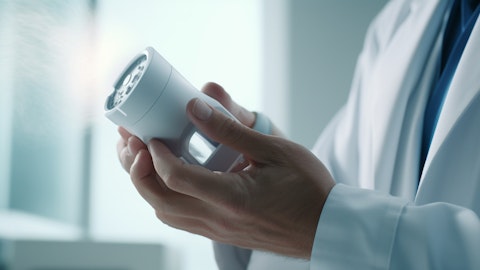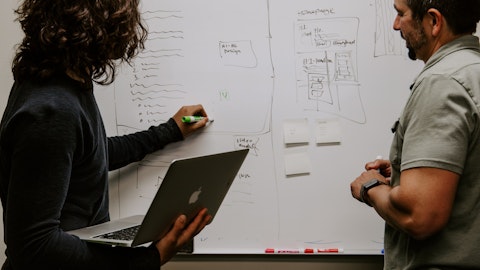Thomas Smith: Got it. That’s helpful. And then on the Afrezza development plans, you have the ongoing INHALE-1 and INHALE-3 studies. But then you also highlighted the potential in gestational diabetes. I was wondering if you could elaborate on that opportunity and whether you think you’d need a specific study to better access that population.
Michael Castagna: Yes. What’s happened is the people doing the INHALE-3 study, some of them, I don’t recall specifically, they were in the study, or they are part of the centers that are in the study. So I apologize for that. But they saw the post-meal challenge results at ATTD, and that’s really what sparked this discussion, which is, wow. We are trying to really control postprandial sugars in the first 120 minutes and keep sugars under 120 and because injectable insulin is so slow, and it just takes about 90 minutes to start working, there’s no way a gestational person can really bring sugars down in two hours when it takes 90 minutes to start working. And so they felt when they saw the meal challenge results, that this could really help change that goal and the guidelines that they’re trying to implement as we go forward.
So then it got into the discussion, which is there’s another. There’s two things we’ve been requested. One is to contribute a drug for a PK study to show that obviously, a gestational woman could inhale the same race as an adult. We don’t have any concerns, but obviously, we’d want to get that data to help support that population. And then the next thing is, there’s a large trial going on out there that they would like us to be part of, and that’s not something we would fund. If that’s something a third party would be funding, we would just be providing a drug and support. So part of this is, what can we help support? And part of this is, what is the market going to do? But if you ask me, are we going to consider doing a large pregnancy trial?
The answer is not at this time but I won’t roll it out forever. I think we got to get the PK data and see what’s good enough and what happened out there because there’s really only two drugs to treat these patients. It’s metformin and rapid-acting insulin. And so they would love to have something that’s for twelve weeks of treatment, roughly, a short time period that works. So that’s been the feedback and discussion. And if all goes well, we’ll hopefully get there. But we’re doing some internal work as well to make sure we feel comfortable with the overall situation and requests.
Thomas Smith: Got it. That makes sense. Thanks for taking the questions. Appreciate it.
Operator: Thank you. I’m showing no further questions at this time. I would now like to turn it back to Michael Castagna, CEO, for closing remarks.
Michael Castagna: I just want to clarify one thing that some of you have commented on via email, which was our share count outstanding. Our shares have not gone up when we are for profit in a quarter yet to show the fully diluted share count. So the average share count is really 270 versus 263 last year, $270 million. So it’s not really going up as much as some of you may have thought on the retail side. Overall, I want to say thank you to Steve again. It was a great quarter. We’re firing on all cylinders. The teams are working really hard on your behalf. We’re really out there to help patients. We have a lot of meetings coming up with ATS. We’re going to be doing some patient advisory boards, physician advisory boards, investigator meetings.
So I think MannKind’s reputation moving into the inhaled orphan lung space is going to dramatically improve this year. And pretty much every quarter from here on out, we’ll start to hopefully have updates on Clofazimine’s progress. Now that we’ve gotten through all the hard work, I’ll say the hard work is now the trial. But getting to this point is a miracle, it’s hard to get drugs through development, and the fact that we’re now able to proceed to phase three and see the light that we can get this to patients in the near future, as fast as drug development could possibly go, we will work as hard as we can to get there. We’re in the best financial position we’ve been in and you saw us deleverage the company. And we’ll continue to do what’s best for shareholders and make sure we’re allocating capital and being prudent with our expenses.
So thank you again. I look forward to seeing some of you at the upcoming investor conferences. And please go ahead and make sure you ask your questions next week. We always want to make sure we have an open dialogue with our shareholders as we have a lot to share and an exciting future and looking forward to continuing to hopefully have great performance over the coming years. Thank you.
Operator: Thank you for your participation in today’s conference. This does conclude the program. You may now disconnect.
Follow Mannkind Corp (NASDAQ:MNKD)
Follow Mannkind Corp (NASDAQ:MNKD)
Receive real-time insider trading and news alerts


